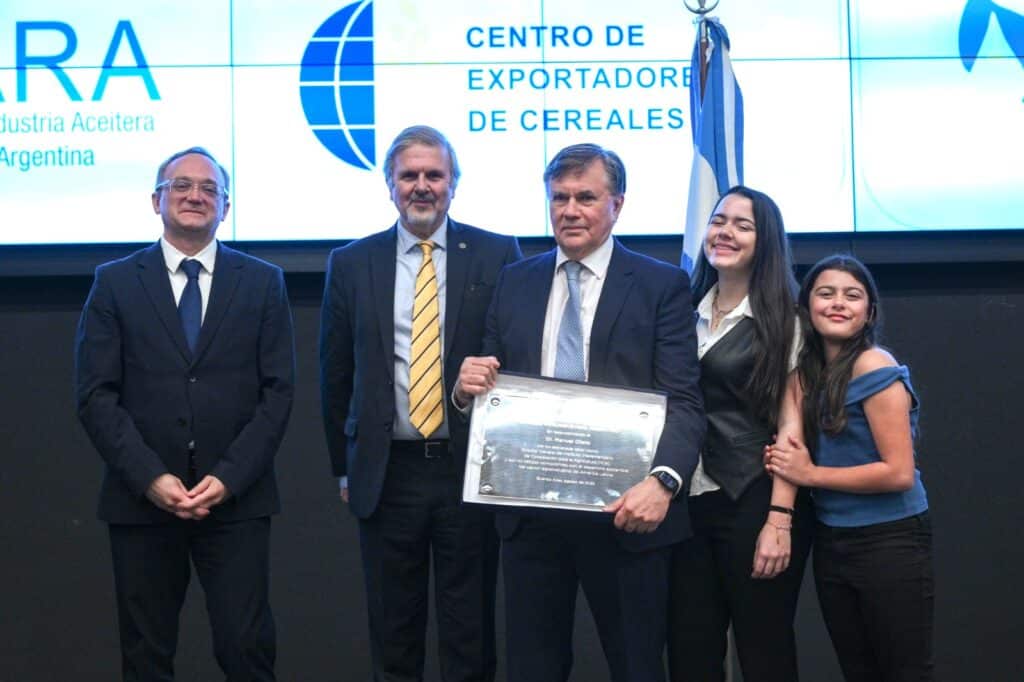
Buenos Aires, 11 August 2025 (IICA) – During a high-level round table discussion in Buenos Aires, international experts and senior officials agreed that agriculture in the Americas must be reimagined, so that it can better address consumer demand and can shape its own future, which will be inextricably linked to science, technology and value addition. The discussion was followed by a ceremony to recognize the career of Manuel Otero.
The Director General of the Inter-American Institute for Cooperation on Agriculture (IICA) was recognized for defending the essential values of agriculture and for his international perspective, during a ceremony organized by the Buenos Aires Grain Exchange. The Exchange is the country’s oldest business entity, founded in 1854.
The discussion panelists were Jack Bobo, Executive Director of the Rothman Family Institute for Food Studies at the University of California, Los Angeles (UCLA), and Kip Tom, Vice Chair of Rural Policy at the America First Policy Institute (AFPI) think tank.
Joining them were the Ministers of Agriculture of Trinidad and Tobago and Panama—Ravi Ratiram and Roberto Linares, respectively—and the Minister of Foreign Affairs of Saint Vincent and the Grenadines, Frederick Stephenson. The three ministers, who represent net food importing countries in Central America and the Caribbean, were in Argentina this week on a visit organized by IICA to deepen trade relations and cooperation.
Ricardo Marra, President of the Grain Exchange opened the discussion, which was moderated by Gustavo Idígoras, President of the Oil Industry Chamber of the Republic of Argentina and the Grain Exporters Center (CIARA-CEC). The participants also included major players in Argentina’s agrifood sector, such as Martín Piñeiro, IICA Director General Emeritus; Marcelo Regúnaga; Eugenio Díaz Bonilla and Alfredo Paseyro.
Food security, the global geopolitical context, the relationship between agrifood trade and the environment, and possible avenues to improve communication in the sector were some of the issues addressed in the discussion, which also sought to anticipate future scenarios.
The speakers pointed out that society today is unaware of the fact that throughout history food shortages have often been a daily reality and that advances in agricultural science and technology have created greater productivity and sustainability that were unthinkable just a short time ago.
Professor Jack Bobo urged all sector stakeholders to anticipate the future, in order to create more favorable conditions. Likewise, he stressed that the world would be much different in 25 years, given the decrease in the population of the countries with the largest populations today, China and India, and the fact that by then the greatest food demand would be from Africa. “We must understand what the future will hold and prepare for it”, he warned.
Kip Tom spoke about the importance of the movement in the United States and other places in the world calling for healthier food and noted that the demand for products of a higher quality would provide a great opportunity for the Americas. “The hemisphere—he said—should adopt a strategy based on value addition, allowing it to overcome its dependence on commodities”.
The Central American and Caribbean ministers spoke in detail about the growing challenges faced by their countries due to increasingly frequent natural disasters and volatile international food prices. “No nation of the Americas can enjoy complete food security until all nations in the region enjoy it”. And the same applies to energy”, stressed the Trinidadian minister, Ravi Ratiram.
Commitment to the hemisphere
In presenting Manuel Otero with a plaque in recognition of his commitment to the region, Idígoras declared: “We are celebrating the career of an Argentinian who over the last forty years has represented us like few others and who has defended agricultural values under all circumstances”. The plaque was presented on behalf of the Grain Exchange, CIARA-CEC, the Argentine Agroindustrial Council and the Argentinian Association of Direct Seeding Producers (AAPRESID).
Igídoras gave a quick overview of the international career of Otero—beginning with his first posting as an Agricultural Attaché in the Argentinian Embassy in the United States, during the first government of the South American country’s return to democracy—while also highlighting his personal and human values.
“If the Americas united into one country, the first American password would be issued to Manuel Otero”, noted Idígoras, in reference to Otero’s commitment to sustainable development in the hemisphere throughout the years.
Otero, accompanied by his seven granddaughters, accepted the plaque and expressed gratitude for the recognition. He recalled his thirty-year career as an international civil servant at IICA and his time as President of the National Agricultural Technology Institute (INTA) of Argentina. He reflected that team building and steadfast confidence in his work were characteristics that had allowed him to continue progressing under all circumstances.
The head of the hemispheric organization surmised that he would soon return to Argentina, with hopes of continuing to contribute to economic and social development. “I hope to be remembered at IICA as a good person and someone who made a positive contribution in a complicated environment, including amidst the restrictions of the COVID-19 pandemic”.
Otero ended by referring to the relationship of trust that IICA had now built with all the countries of the Americas and said he was confident in its strength: “IICA is one of the international organizations in the best financial position today. If the countries of the Americas continue to trust us, IICA will be around for many years more”.
More information:
Institutional Communication Division.
comunicacion.institucional@iica.int











